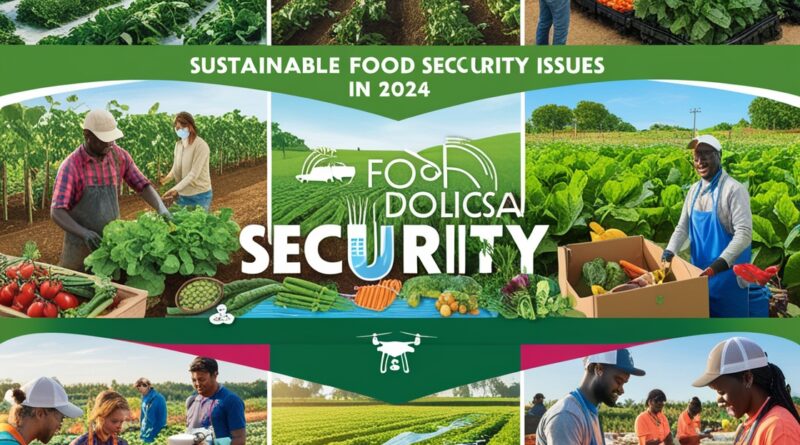“Addressing Food Security Issues in 2024: Challenges and Sustainable Solutions”
Addressing Food Security Issues in 2024 : Challenges and Sustainable Solutions
Food security remains one of the most pressing global issues in 2024. With rising food prices, climate change, and geopolitical conflicts, ensuring access to sufficient, safe, and nutritious food for all is more critical than ever. This article delves into the current food security challenges and explores sustainable solutions to address these issues.
The Current State of Food Security issues
In 2024, food insecurity affects millions worldwide, with significant impacts in low- and middle-income countries. According to the World Bank, food price inflation remains alarmingly high, exacerbating the vulnerabilities of already struggling populations (World Bank). The Food and Agriculture Organization (FAO) and the World Food Programme (WFP) have identified 18 critical hunger hotspots, including regions like South Sudan, Mali, and Gaza, where immediate intervention is necessary to prevent famine (World Bank).
Major Factors Contributing to Food Security Issues
- Climate Change: Climate change is a significant driver of food insecurity. Extreme weather events, such as droughts, floods, and hurricanes, disrupt agricultural production and reduce crop yields. Changing precipitation patterns and rising temperatures also alter growing seasons, making it difficult for farmers to plan and harvest effectively.
- Economic Instability: Economic challenges, including inflation and unemployment, reduce people’s purchasing power, making it harder for families to afford nutritious food. The COVID-19 pandemic has further strained economies, leading to increased poverty and hunger.
- Conflict and Displacement: Armed conflicts and political instability displace millions, disrupting food production and distribution networks. In war-torn regions, agricultural activities are often halted, and access to food becomes severely limited. The ongoing conflicts in places like Syria and Yemen are prime examples of how war exacerbates food insecurity.
- Supply Chain Disruptions: Global supply chain disruptions, triggered by events like the COVID-19 pandemic, have highlighted the fragility of food systems. Delays in transportation, trade restrictions, and labor shortages affect the availability and affordability of food worldwide.
Sustainable Solutions to Food Security Issues
- Promoting Sustainable Agriculture: Sustainable agriculture practices, such as crop rotation, agroforestry, and organic farming, enhance soil health and increase resilience to climate change. These practices reduce the dependency on chemical inputs, lower greenhouse gas emissions, and improve food security by ensuring long-term productivity.
- Enhancing Food Supply Chains: Strengthening food supply chains through better infrastructure, improved logistics, and technology integration can reduce food loss and waste. Cold storage facilities, efficient transportation networks, and digital tracking systems ensure that food reaches consumers quickly and safely.
- Investing in Agricultural Innovation: Innovation in agriculture, such as the development of drought-resistant crops and precision farming technologies, can significantly boost food production. Genetically modified organisms (GMOs) and advanced irrigation systems are examples of how science can address food security challenges.
- Supporting Smallholder Farmers: Smallholder farmers play a crucial role in global food production, especially in developing countries. Providing them with access to credit, training, and modern farming tools can increase their productivity and income, thereby enhancing food security.
- Implementing Social Protection Programs: Social protection programs, including food assistance and cash transfers, can mitigate the impact of economic shocks on vulnerable populations. These programs ensure that even the poorest households can access sufficient food during crises.
- Addressing Food Waste: Reducing food waste is essential for improving food security. Initiatives such as consumer education, better food storage techniques, and food recovery programs can minimize waste at all stages of the food supply chain.
The Role of International Organizations
International organizations like the World Bank, FAO, and WFP are pivotal in addressing food security issues. They provide critical funding, technical assistance, and policy support to countries grappling with food insecurity. Collaborative efforts between governments, NGOs, and the private sector are essential for implementing effective food security strategies.
Conclusion
Addressing food security issues in 2024 requires a multifaceted approach that combines sustainable agricultural practices, innovative technologies, and robust social protection programs. By understanding the underlying causes of food insecurity and implementing comprehensive solutions, we can work towards a world where everyone has access to sufficient, safe, and nutritious food.
References:
- “Food Security Update: World Bank Response to Rising Food Insecurity,” World Bank, July 2024 (World Bank).
- “Hunger Hotspots: FAO-WFP Early Warnings on Acute Food Insecurity,” FAO and WFP, June 2024 (World Bank).
For more similar stories head here



